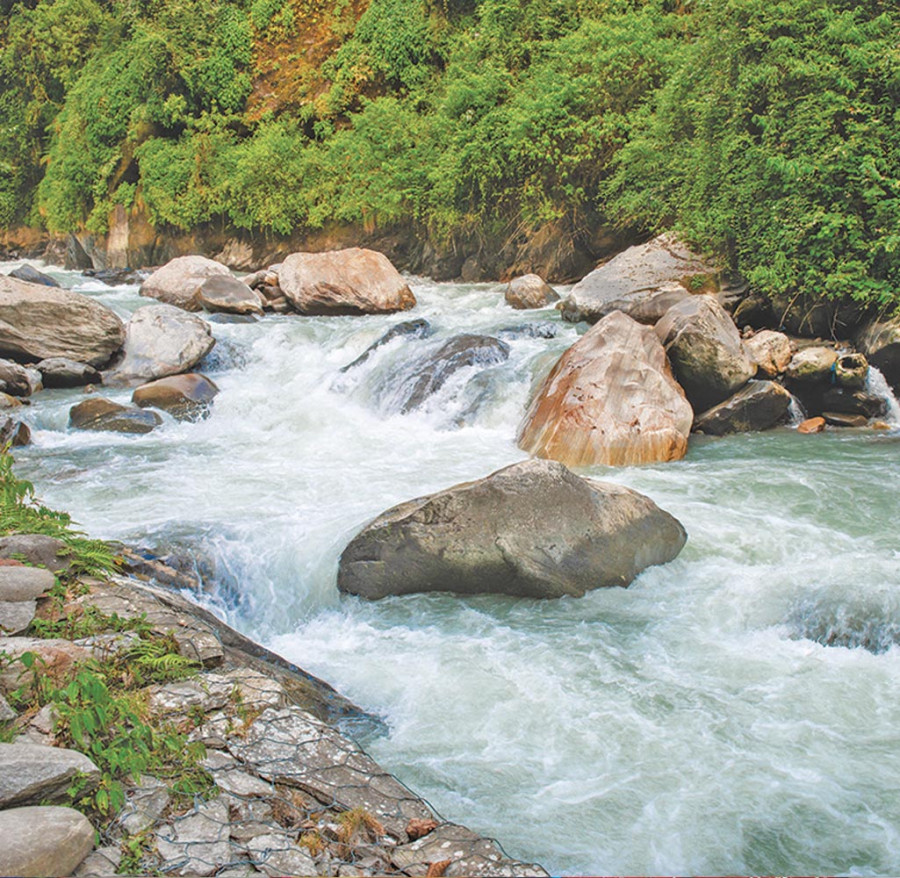National
Nepali developers likely to sign MoU with Indian power buyers in direct deal
Power ministers from India, Bangladesh, Bhutan and Sri Lanka are invited to the Power Summit in Kathmandu on April 18-19.
Post Report
Nepal’s domestic private sector hydropower project developer and Indian buyer could sign a memorandum of understanding (MoU) for direct power purchase in the Power Summit scheduled to be held on April 18-19.
Independent Power Producers' Association, Nepal (IPPAN), which is organising the eighth edition of the Power Summit in Kathmandu, said that negotiations were ongoing between the two sides to make the event fruitful.
Office bearers of the IPPAN, however, refused to divulge the companies involved in such a deal saying that it is still premature to share details as such revelation could derail the deal.
Even though Indian companies such as SJVN Limited and GMR Energy, which are developing 900MW Arun 3 and 900MW Upper Karnali projects, have signed direct power purchase agreements with Indian buyers, no domestic company of Nepal has so far signed an agreement with Indian buyers.
“If that happens, it will be a breakthrough for Nepal’s domestic company to sell power directly to Indian buyers,” said Ashish Garg, vice-president of IPPAN, at a press meet in Kathmandu on Wednesday.
Nepal’s electricity law has no provision for granting any company other than Nepal Electricity Authority a right to trade power. But Garg argued that the hydropower companies could directly deal with buyers as per Section 22 of the Electricity Act-1992.
Section 22 (2) of the Act says, “the licensee [developer] desiring to export electricity generated on its own to the foreign country may do so by entering into an agreement with the Government of Nepal on such matter”.
Despite continued insistence from the private sector, the government failed to get the bill to amend the Electricity Act-1992 passed by the previous parliament. The bill registered in the National Assembly in July 2020 had provisions for granting trading licences to the private sector.
In September last year, the government withdrew the bill after it became clear that it would not pass Parliament. According to the energy ministry, about half a dozen companies have already submitted their applications for trading licences. Currently, the developers have only one option—selling power to the Nepal Electricity Authority. “Without trading licence, the private sector companies cannot sign power purchase agreement deals,” said Krishna Prasad Acharya, the IPPAN president. “We will continue to make efforts for such legal provisions allowing the private sector to get trading licences.”
In January last year, Nepal Power Exchange Limited and India’s Manikaran Power Limited signed a memorandum of understanding on energy trading. But its implementation was hamstruck by the lack of law in Nepal that grants trading licences. Nepal Power Exchange Limited has not received a trading licence.
Besides potential signing of direct purchase agreement between hydropower developer and the buyer, many other agreements and understanding for future development of power projects and market creation in renewable energy could be reached at the power summit, according to the IPPAN.
Acharya said that the government has sent invitations to the power ministers of India, Bangladesh, Bhutan and Sri Lanka for their participation in the summit at the IPPAN’s request.
The South Asian Forum on Energy Investment (SAFEI) will also release a report on mobilising investment in the region during the power summit.
The umbrella body of the private sector power developers said that about 800 participants including 300 international delegates from more than 30 countries are expected to participate in the summit.
“The Indian delegates will be present in large numbers as the Indian Embassy in Kathmandu is the country partner for the event,” the IPPAN stated.
Energy trading companies, power producers, financial institutions, transmission and distribution companies, consulting companies, vendors, and think tanks, among other stakeholders, are invited to the event, it said.
The event comes at a time when Nepal is aiming to export its surplus energy in the wet season for the next few years and around the year after the country becomes fully self-reliant on electricity possibly by 2026.
Nepal’s total installed capacity has reached 2,520MW and an additional 600MW is expected to be added in 2023, according to IPPAN. Nepal is likely to have a generation capacity of 6,700MW by 2027 with the private sector’s contribution reaching 80 percent to the total power generation capacity from the current 55 percent. Nepal has committed to becoming a net zero country by 2045 mainly through the use of green energy.




 20.12°C Kathmandu
20.12°C Kathmandu













